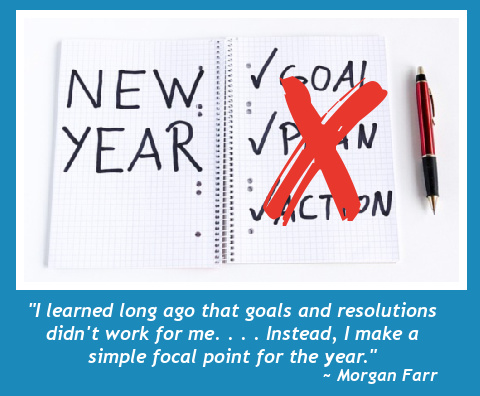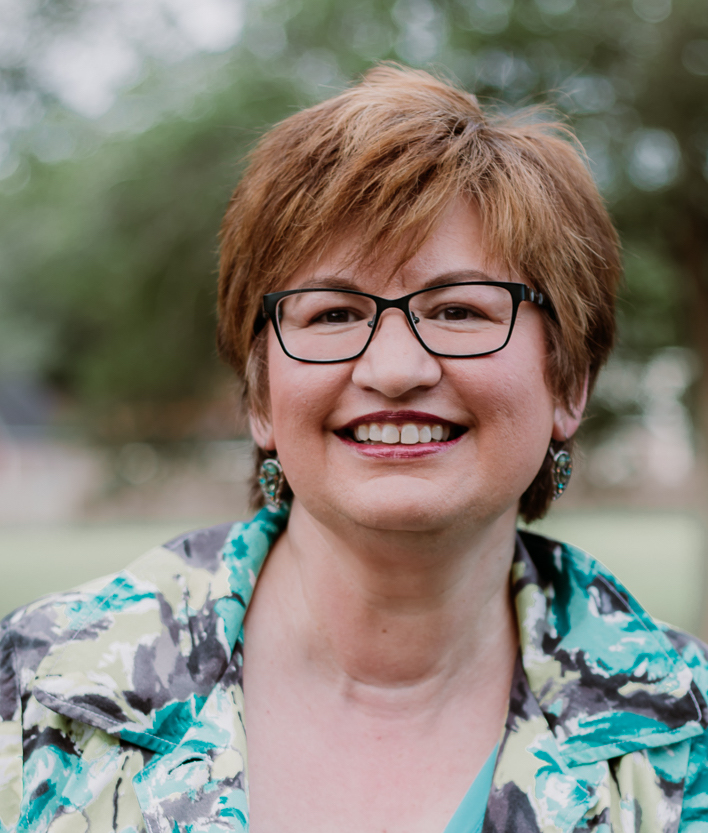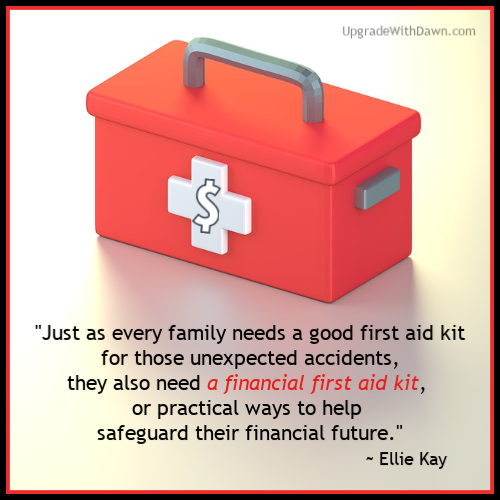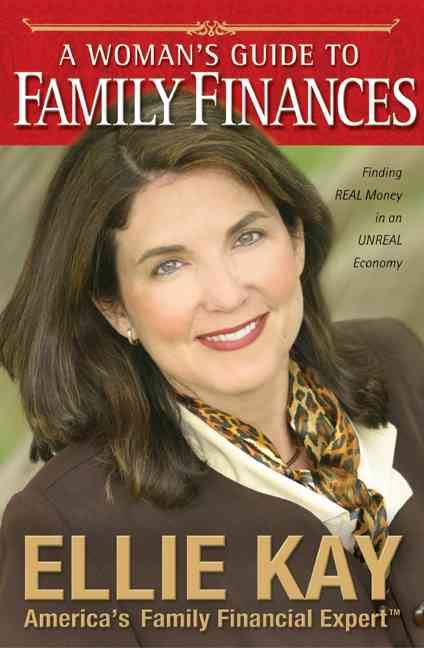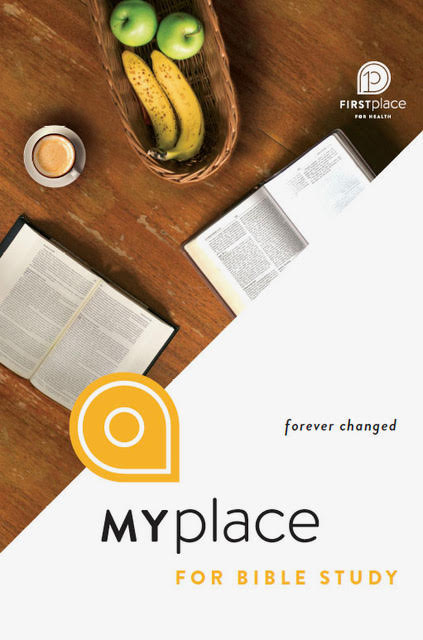Don't. Look. Back.
Susan Stewart writes practical, often humorous encouragement to the family of God, written from a biblical perspective. In this New Year's UPGRADE, she says we need a God-focused, forward point of view in the new year.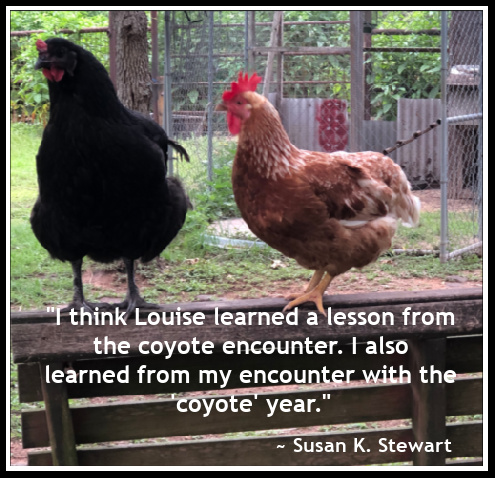
"Many of us experienced drought conditions in 2022. Central Texas was no different," Susan says.
"We knew the situation was worsening when coyotes began moving closer to the ranches. During that time, our hen Louise learned the perils of a coyote on her tail . . . literally." (Louise is the black hen, pictured above.)
I (Dawn) don't like it when wildlife moves closer to homes. I live in a part of California where coyotes get too close for our comfort. I'm glad I don't have chickens to protect! I love it that Susan created this teachable moment.
Susan continues . . .
Louise and her pal Thelma didn’t like to stay in the yard with the other chickens. They were ever stretching their boundaries.
One hot afternoon, I heard a chicken warning squabble. I looked out to see Louise running as fast as her legs could take her with a coyote right behind her. Apparently, she forgot she fly back into the safety of the yard.
Once the hungry predator heard our dogs, it turned from Louise and darted into the trees.
I noticed it didn’t have a chicken in its mouth. I found a pile of feathers at the back of the house, but no Louise.
She returned to the coop in the evening, as chickens will do.
Louise returned without tail feathers.
How did this feisty hen managed to outrun the wiley coyote? She followed the advice of track coaches everywhere: “Don’t look back.”
Each time a runner turns her head to see where the competition is, she slows her pace. Louise just kept looking and running forward for a way of escape.
For our family, and maybe yours, the year 2022 was a “terrible, horrible, no-good, bad” year.
The coyote was behind us.
Even though 2023 has just begun, it’s easy to look over our shoulder to see what happened in the past and not move forward. We can get stuck watching for another attack.
But like Louise, we mustn’t look back at the pursuing enemy.
I’ve adopted the words “Don’t. Look. Back.” as my theme this year. I’ve made it my goal not to relive the terrible,the horrible, the no-good, the bad.
God has given us three ways to look forward.
1. Put our hand to the plow.
When 2022 began, we had no idea it would be a forgettable year. I don’t know about 2023.
Jesus tells us we're to plow forward without looking back (Luke 9:62).
There it is in God’s word—Don’t. Look. Back.
2. Look to Jesus.
No matter the circumstances, our focal point is Jesus. Why? He is the founder and perfector of our faith; he gives us joy (Hebrews 12:2).
As we look to Jesus, as the old hymn says, “things of earth grow strangely dim.”
3. Understand God’s plan.
No matter what has happened in the past, God has established plans for our good to give us a future with hope (Jeremiah 29:11).
We can look forward with our eye on Jesus—to God’s good even in the “terrible, horrible, no-good, bad” circumstances.
Oh, how is Louise doing?
Her tail feathers have grown back, and she still leaves the safe enclosure of the yard now and then. Sadly, her friend Thelma didn’t return from one of her trips to the “wild.”
I think Louise learned a lesson from the coyote encounter.
I also learned from my encounter with the “coyote” year.
God is our safe enclosure—if we only look to Him.
Did you have a “terrible, horrible, no-good, bad” experience? How has looking to Jesus without looking back carried you through?
 Susan K. Stewart is Managing Editor with Elk Lake Publishing. When she’s not tending chickens, peacocks, and donkeys, Susan teaches, writes, and edits
Susan K. Stewart is Managing Editor with Elk Lake Publishing. When she’s not tending chickens, peacocks, and donkeys, Susan teaches, writes, and edits  non-fiction. Her passion is to inspire readers with practical, real-world solutions. Her books include Science in the Kitchen, Preschool: At What Cost?, Harried Homeschoolers Handbook, and the award-winning Formatting e-Books for Writers. Susan's latest book, Donkey Devos: Listening When God Speaks, is a devotional based on life with her donkeys. You can learn more about Susan at her website www.susankstewart.com.
non-fiction. Her passion is to inspire readers with practical, real-world solutions. Her books include Science in the Kitchen, Preschool: At What Cost?, Harried Homeschoolers Handbook, and the award-winning Formatting e-Books for Writers. Susan's latest book, Donkey Devos: Listening When God Speaks, is a devotional based on life with her donkeys. You can learn more about Susan at her website www.susankstewart.com.
 Post a Comment → Posted on
Post a Comment → Posted on  Tuesday, January 24, 2023 at 10:13AM
Tuesday, January 24, 2023 at 10:13AM  Chickens,
Chickens,  Don't Look Back.,
Don't Look Back.,  God's plan,
God's plan,  Look to Jesus,
Look to Jesus,  New Year's,
New Year's,  Susan K. Stewart,
Susan K. Stewart,  Tailless Chicken,
Tailless Chicken,  Upgrade with Dawn Upgrade Your Life
Upgrade with Dawn Upgrade Your Life  New Year,
New Year,  Perspective
Perspective 




